The Night The Camels Came
by Charles A. Hooey
It seems incredible that fourteen of the
greatest operas ever written popped up in wintry Winnipeg,
capital city of Manitoba,
Canada, nearly a century ago. Leading off was Verdi's Aida in
a production that fairly reeked of ancient Egypt, much to the
delight of all in the Walker Theatre that Monday, the second
of February 1914. The instigator of this magic was Irishman
Thomas Quinlan (pictured), once Thomas Beecham's right hand
in similar endeavours.
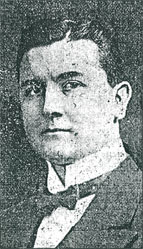 Quinlan unveiled a rostrum of fine singers, mostly British,
a few Americans, even a token Canadian, and two superb conductors
to inspire them. Five nights earlier, the Walker had rocked
to
a pivotal suffragette rally; now Verdi, Wagner et al held the
stage with a different form of excitement…
Quinlan unveiled a rostrum of fine singers, mostly British,
a few Americans, even a token Canadian, and two superb conductors
to inspire them. Five nights earlier, the Walker had rocked
to
a pivotal suffragette rally; now Verdi, Wagner et al held the
stage with a different form of excitement…
That first night, Quinlan introduced five stalwarts who would
return again and again as the series unfolded. As the slave
Aida, comely US-born Jeanne Brola was favorably greeted; she
was "trained
to take the high notes easily and with notable clearness and
purity of tone." The best impression, however, was made
by Edna Thornton as Amneris (pictured), her "high contralto
of decidedly pleasing quality, ringing full, strong and clear
in the higher
notes." As Radames, Maurice d'Oisly was suitably statuesque
and heroic 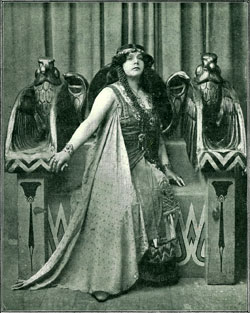 while "emotional intensity marked the singing
and acting of W. J. Samuell" as Amonasro. Tullio Voghera
led an "orchestra, already of imposing proportions, made
still larger by the addition of the regular musicians of the
Walker. Overall they made "gorgeous stage pictures (that)
were a feast to the eye." It is worth noting this production
impressed the Khedive of Egypt so much he urged Quinlan to
stage it on the banks of the Nile, as Verdi had for his predecessor.
while "emotional intensity marked the singing
and acting of W. J. Samuell" as Amonasro. Tullio Voghera
led an "orchestra, already of imposing proportions, made
still larger by the addition of the regular musicians of the
Walker. Overall they made "gorgeous stage pictures (that)
were a feast to the eye." It is worth noting this production
impressed the Khedive of Egypt so much he urged Quinlan to
stage it on the banks of the Nile, as Verdi had for his predecessor.
Quinlan's British Opera Company had been on the move for months,
playing first in South Africa, then Australia; now, at last,
they were going home through Canada. They dropped anchor in
Vancouver on 13th January and soon were shaking local rafters,
somehow
packing nine performances into five days. Then to travel east,
it was "necessary to charter from the CPR two standard coaches,
four tourist cars, two diners, two luggage vans and nine baggage
cars. Two special trains coast to coast represented the greatest
touring opera company in the world." They traversed the
Rocky Mountains and foothills, alighting briefly in Alberta to
dispense their wares, before rattling over snow-swept prairies
to "The Gateway to the West" and home to 200,000 souls.
Winnipeg could trace its origins to the fur trade when trappers
would paddle birch bark canoes laden with precious cargo to
the junction of the Red and Assiniboine Rivers. Here, a tiny
trading
post sprang up, drawing its name from the Cree Indian words
meaning "muddy
waters". Winnipeg remained so, a little out-of-the-way outpost
of some 1400, until the Canadian Pacific Railway burst upon the
scene late in the 1800s, bringing settlers, a trickle at first,
then a torrent. It was boom time, truly! "We'll be the Chicago
of the North!" was the oft-heard cry. In 1907 showman Corliss
Walker gambled by erecting an ornate emporium he fondly viewed
as "Canada's finest theatre."
To this stage, Quinlan had come. With the Great War still six
months distant, no embargo against the staging of Wagner's
operas existed, so he did not disappoint. He mounted The Flying Dutchman,
Lohengrin, Tannhäuser and a superb Mastersingers along
with Puccini's Bohème, Tosca, Madama Butterfly and The
Girl of the Golden West, Verdi's Rigoletto plus Aida and
French operas Louise, Faust, Samson and Delilah and The
Tales of Hoffmann, the latter pair being given twice. It
was a veritable feast for opera fanciers!
 Richard
Eckhold, the other conductor, appeared on Tuesday as the Company
revealed its strength. Only the bass who sang Ramphis
in Aida appeared in Faust. "William Anderson's
acting revealed the suavity, demoniacal cunning and gloating
wickedness of Méphistophélès ... and his
rich and resonant bass-baritone voice was continually heard
with much pleasure. Evelyn Parnell (pictured), an American
soprano who had been
singing at the Boston Opera, was especially engaged to sing
in Winnipeg. She was related to the famous Irish leader and
had
sung once previously with Quinlan in Dublin as Violetta in La
Traviata. Her local debut as Marguerite may be summed up
as being replete with a natural grace and marked by an artistic
intelligence that made itself felt in every scene." She
was also to sing Mimi but Felice Lyne appeared instead.
Richard
Eckhold, the other conductor, appeared on Tuesday as the Company
revealed its strength. Only the bass who sang Ramphis
in Aida appeared in Faust. "William Anderson's
acting revealed the suavity, demoniacal cunning and gloating
wickedness of Méphistophélès ... and his
rich and resonant bass-baritone voice was continually heard
with much pleasure. Evelyn Parnell (pictured), an American
soprano who had been
singing at the Boston Opera, was especially engaged to sing
in Winnipeg. She was related to the famous Irish leader and
had
sung once previously with Quinlan in Dublin as Violetta in La
Traviata. Her local debut as Marguerite may be summed up
as being replete with a natural grace and marked by an artistic
intelligence that made itself felt in every scene." She
was also to sing Mimi but Felice Lyne appeared instead.
"Spencer Thomas acted the part of Faust acceptably and
sang with an appealing quality of tone when he did not force
his voice, which is a genuine tenor." In 1906, while wrapping
up his studies at London's Royal College of Music, he sang Captain
Trevor in Stanford's Shamus O’Brien as a sort
of prelude to his career. Graham Marr made his presence felt
as
Valentine with his bright, rich and powerful high baritone.
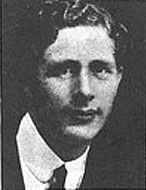 Thomas
returned for the Wednesday matinee as "the handsome
Hoffmann with the golden voice and gallant manners. It is in
the second episode, perhaps, that one enjoys him most. Here
it is that Edna Thornton demonstrates to capacity, as Giulietta,
the glorious melody of her lovely high contralto, and it is
also
in this love affair that W. J. Samuell (pictured) as Dapertutto
delights the audience with the lusty force of his splendid
baritone.
His duet with Mr. Thomas was a marvel of vigorous harmony." As
Olympia, petite Felice Lyne (pictured below) "in her little
baby-girl dress, her dainty, childish features and consistently
immobile
pose
gave the automaton its essential quaint charm." Alice
Prowse appeared in the third ‘tale’ "her soft,
restrained soprano eminently suiting the role of the consumptive
Antonia." As
Coppelius and later as Dr. Mirakel, Irish basso Charles Magrath
did notable work.
Thomas
returned for the Wednesday matinee as "the handsome
Hoffmann with the golden voice and gallant manners. It is in
the second episode, perhaps, that one enjoys him most. Here
it is that Edna Thornton demonstrates to capacity, as Giulietta,
the glorious melody of her lovely high contralto, and it is
also
in this love affair that W. J. Samuell (pictured) as Dapertutto
delights the audience with the lusty force of his splendid
baritone.
His duet with Mr. Thomas was a marvel of vigorous harmony." As
Olympia, petite Felice Lyne (pictured below) "in her little
baby-girl dress, her dainty, childish features and consistently
immobile
pose
gave the automaton its essential quaint charm." Alice
Prowse appeared in the third ‘tale’ "her soft,
restrained soprano eminently suiting the role of the consumptive
Antonia." As
Coppelius and later as Dr. Mirakel, Irish basso Charles Magrath
did notable work.
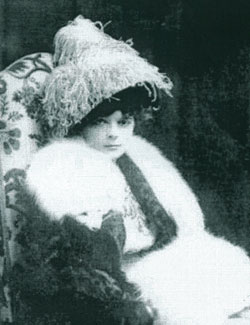 That evening for the first time in Canada, the Paris version
of Tannhäuser was given with legendary recording
star soprano Perceval Allen as Elisabeth, proving she "has
the imposing physique of the typical prima donna and a voice
that is brilliant, clear, and of sufficient power. Her singing
and acting showed that she felt the emotion that naturally belongs
to her role and in every way she had excellent success." With
his robust voice, Francis Costa made much of the title part "with
an earnestness and an evidence of understanding that carried
complete conviction." Robert Parker's Wolfram displayed
a voice that is clear and powerful with a quality that is especially
pleasing when he sings in subdued style. And "Gladys Ancrum
made a graceful Venus, and she acted the part with a persuasive
power that any man would find hard to resist."
That evening for the first time in Canada, the Paris version
of Tannhäuser was given with legendary recording
star soprano Perceval Allen as Elisabeth, proving she "has
the imposing physique of the typical prima donna and a voice
that is brilliant, clear, and of sufficient power. Her singing
and acting showed that she felt the emotion that naturally belongs
to her role and in every way she had excellent success." With
his robust voice, Francis Costa made much of the title part "with
an earnestness and an evidence of understanding that carried
complete conviction." Robert Parker's Wolfram displayed
a voice that is clear and powerful with a quality that is especially
pleasing when he sings in subdued style. And "Gladys Ancrum
made a graceful Venus, and she acted the part with a persuasive
power that any man would find hard to resist."
A lavish setting that cost Quinlan an extra $2000 came next. "As
Louise, Jeanne Brola made excellent use of her voice of liquid
purity." Maurice d'Oisly played the part of the seductive
lover satisfactorily, though not with overflowing fervour. Edna
Thornton "was admirable from start to finish, filling the
role of the ill-tempered mother to perfection," while in
the last act she showed the power of passionate utterance when
required. "Complete satisfaction was given by Samuell as
the father. He has feeling in abundance, and he sings with good
quality and much power." The orchestra played admirably
under Signor Voghera. Especially pleasing was Act 3 at the dressmaker's
where Gladys Ancrum sang with spirit and fine vocal effect.
On Friday, in The Flying Dutchman, the dominating figure
was Robert Parker..."in his quiet and respectful appeal
to Senta his singing was notable for its very agreeable vocal
quality. In the duet and trio that followed the music rose to
a thrilling climax that was simply irresistible. Here the glory
was shared with Perceval Allen and William Anderson. ... Madame
Allen's brilliant and powerful voice had good opportunities and
she took full advantage of them all." The always pleasing
tenor voice of d'Oisly was effective in the role of Erik, while
Edith Clegg gave value as Senta's nurse.
Edna Thornton had been a standout at Covent Garden for years.
Now 39 years old and at her peak, she could just as easily
have been singing on the Metropolitan Opera stage in New York.
So
why was she in Winnipeg? It must have been a fascination for
travel as she had been with Quinlan since he began world venturing
in 1912. After Capetown and Sydney, she may have found little
to like in rough and ready Winnipeg but at least, as she traipsed
the world over, many more were able to enjoy her glorious voice.
At the Saturday matinee she sang her most famous role, Delilah
in Saint-Saens' opera... "splendid as was Edna Thornton
as Giulietta, satisfying and thorough as the mother of Louise,
as Delilah, she reaches a pitch of excellence where mere words
of praise are banal and inept - where clapping was incongruous.
One longed for some quietly artistic method of conveying to her
one's gratitude. Those who heard her sing `Softly awakes my heart'
will remember the glory of her voice as long as they live. Gowned
in a decolette glistening white, a garland of roses passing from
waist to shoulder, she was a vividly seductive Delilah, consummately
effective in every pose and gesture."
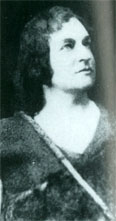 Francis
Costa (pictured) "was entirely satisfying as Samson. Roughly
garbed, brawny arms bared, his hair and beard uncut, he looked
indeed the man, valiant and fearless in war, gentle and simple
in peace. His impassioned singing never failed to win the audience's
sympathy. Graham Marr's vibrant, powerful basso added to his
imposing physique, also eminently suited the role of the strenuous
High Priest of Gaza."
Francis
Costa (pictured) "was entirely satisfying as Samson. Roughly
garbed, brawny arms bared, his hair and beard uncut, he looked
indeed the man, valiant and fearless in war, gentle and simple
in peace. His impassioned singing never failed to win the audience's
sympathy. Graham Marr's vibrant, powerful basso added to his
imposing physique, also eminently suited the role of the strenuous
High Priest of Gaza."
Next, wholly new to the city, La Tosca enabled "Madame
Brola to rise to the height of her ability. Love and hate could
hardly find situations more conducive to passionate expression,
and the young singer, putting herself unreservedly into the role,
acted and sang with the most thrilling effect. As Cavaradossi,
Mr. d'Oisly also put a very impressive amount of energy into
his part. The part of Scarpia fell to Mr. Samuell who made a
very pronounced success of all phases of his role. All distinguished
themselves, as did conductor Tullio Voghera, who was recalled
with the singers to accept a tribute that probably surpassed
in duration anything of the kind during the week."
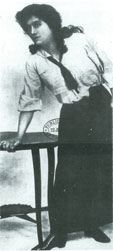 Brola led off Week Two in The Girl of the Golden West,
her Minnie achieving "a splendid success... Her beautiful
voice made its usual excellent impression. It is so clear that
it could be heard distinctly above the din made by the combined
male voices and the orchestra in the last act. Robert Parker
cut an imposing figure as the Sheriff and both his singing and
his acting were of a high order. The pleasing tenor of Spencer
Thomas was in good condition and his impersonation of Johnson
was all that could be desired." In fact, the cast approximated
that which elicited heartfelt praise and gratitude from the composer
when he heard them in England.
Brola led off Week Two in The Girl of the Golden West,
her Minnie achieving "a splendid success... Her beautiful
voice made its usual excellent impression. It is so clear that
it could be heard distinctly above the din made by the combined
male voices and the orchestra in the last act. Robert Parker
cut an imposing figure as the Sheriff and both his singing and
his acting were of a high order. The pleasing tenor of Spencer
Thomas was in good condition and his impersonation of Johnson
was all that could be desired." In fact, the cast approximated
that which elicited heartfelt praise and gratitude from the composer
when he heard them in England.
In Rigoletto, Felice Lyne and Samuell teamed to score "a
veritable triumph, the former by her exquisitely beautiful singing,
the latter by his magnificent impersonation of the ill-fated
jester. Miss Lyne's delightfully fresh, sweet, and clear voice
is of the naturally high, flexible coloratura type, and her management
of it is not far from perfect...she can sing a trill that is
a real trill, not merely a shake. Even the brilliant high E with
which she concluded her vocal flight in Act 2 seemed to be taken
with ease, and held unwaveringly to the pitch."
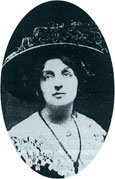 Samuell's
jester showed his mettle, "his
haggard, grief-stricken, face and his agonized entreaties in
the second act ought to have
drawn compassion from 'brassy bosoms and rough hearts of flint'
and the paroxysm of grief, with which he brought the action
of the drama to an end, was affecting in the extreme ... Mr.
d'Oisly was a manly Duke with a bonhommie of manner that accorded
properly with his role's ongoing propensities. He sang 'La
donna e mobile' with such effect that an encore was demanded
but not
responded to. Robert Veevers, in voice, manner and physique,
did justice to the part of the hireling assassin." Finally,
Miss Clegg (pictured) sang and acted pleasingly as Maddalena.
Samuell's
jester showed his mettle, "his
haggard, grief-stricken, face and his agonized entreaties in
the second act ought to have
drawn compassion from 'brassy bosoms and rough hearts of flint'
and the paroxysm of grief, with which he brought the action
of the drama to an end, was affecting in the extreme ... Mr.
d'Oisly was a manly Duke with a bonhommie of manner that accorded
properly with his role's ongoing propensities. He sang 'La
donna e mobile' with such effect that an encore was demanded
but not
responded to. Robert Veevers, in voice, manner and physique,
did justice to the part of the hireling assassin." Finally,
Miss Clegg (pictured) sang and acted pleasingly as Maddalena.
For the gathering of Puccini's beloved Bohemians, a matinee
setting should have seemed ideal. Miss Lyne's acting was a
surprise. "Delightful
she was as Gilda, but could she enact the consumptive character
of Mimi? She did with a fine sense of its possibilities and delved
deeper than that, right down into the heart of the role. As Rudolph,
Maurice d'Oisly was in splendid fettle, and when he is thus,
his audiences go out to meet him halfway. Of course, Samuell
was good as Marcel; so was Alice Prowse as Musetta, "gaudily
dressed in navy and green, which made a spirited contrast to
her gentle friend, and obviated any morbidness."
“
Lohengrin was grand!” The Winnipeg Tribune exclaimed in
its review of Wednesday evening's endeavor. Again Edna Thornton
led the way in kudos for her malevolent Ortrud but it was clear "the
singing and acting of Jeanne Brola as Elsa was a work of art.
Her portrayal held the note of pure womenhood which counts for
much, and aided by the artistic use of a well-trained soprano,
sang the Wagnerian music with impassioned fervour. As Lohengrin,
Spencer Thomas was in capital voice, his assumption of the role
was correspondingly satisfactory...He gradually warmed for the
glorious duet with Elsa in the bridal chamber, his lyric tenor
ringing out high notes to splendid effect; and with Miss Brola's
finished vocalism was so much to the liking of the audience that
they had to respond to several curtain calls. Mr. Thomas was
also deeply impressive in the final scene in which he takes his
departure."
"
The soprano's mildly impassioned acting accorded well with a
sensible conception of the character of Elsa, which contrasts
very strongly with that of the passionately malicious Ortrud...The
role is not calculated to arouse sympathy, but Edna Thornton
certainly made it a means of appeal to the admiration of the
audience...even when the text obliged her to keep silent..." With
Parker singing Telramund, this character assumed a deeper significance.
On Thursday, 12th February, in the second Tales of Hoffmann veteran
E. C. Hedmondt sang the poet's role with the others much the
same, presumably securing a similar result.
Mastersingers was deemed the finest, entailing as it
did the services of almost the full company. Charles Wheeler
of the
Tribune called it "Superb!...it will linger long in the
memories of every soul present." Chief vocal honours belonged
to Robert Parker, whose "impersonation was as clear cut
as can be with a noble bass voice to light the character. Infinitely
sympathetic in the first act, his histrionic ability was put
to virile use in the second act in that long soliloquay [sic],
a most artistic deliverance, and his scene with Beckmesser overflowed
with quiet humor. Mr. Parker's monologues were at once tender,
dignified and commanding." Spencer Thomas's tenor was heard
to greatest advantage in the last act in which he wins Eva's
hand in marriage by singing the Prize Song. Eva in the hands
of Jeanne Brola was sweet simplicity itself. The part of David,
the apprentice, was made more than usually prominent by tenor
Maurice d'Oisly whose fun-making propensities were very acceptable.
Sydney Russell as Beckmesser properly made the character vain
and silly as Walther's rival for the hand of Eva, contrasting
vividly with his more serious confreres." Quinlan smiled
in contentment as "thunderous volleys of applause rolled
through the spacious auditorium."
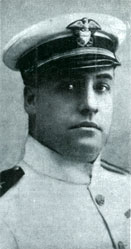 It
was time to exit, and he did in style. In the Saturday matinee Madama
Butterfly, Jeanne Brola had ample chances to shine, while
a second Samson and Delilah wrapped things up that evening.
To see Puccini's masterwork, the audience filled the theatre
and found absolutely nothing to criticize. "It was a brilliant
success! Brola's singing of `One bright day' was one of the
memorable features of her thoroughly artistic and exceedingly
impressive
presentation. Mr. d'Oisly (pictured) had good success in the
role of Pinkerton, his singing having its usual effect. Mr.
Samuell
made a sympathetic
consul and Mr. Russell acted effectively the part of the marriage
broker. Mabel Dennis the faithful servant was very well liked."
It
was time to exit, and he did in style. In the Saturday matinee Madama
Butterfly, Jeanne Brola had ample chances to shine, while
a second Samson and Delilah wrapped things up that evening.
To see Puccini's masterwork, the audience filled the theatre
and found absolutely nothing to criticize. "It was a brilliant
success! Brola's singing of `One bright day' was one of the
memorable features of her thoroughly artistic and exceedingly
impressive
presentation. Mr. d'Oisly (pictured) had good success in the
role of Pinkerton, his singing having its usual effect. Mr.
Samuell
made a sympathetic
consul and Mr. Russell acted effectively the part of the marriage
broker. Mabel Dennis the faithful servant was very well liked."
Not all sixteen performances played to capacity, primarily
as Winnipeg's moneyed folk expressed little interest…it seems
they were too busy chasing more dollars, thus leaving many $4.00
main floor seats empty. In contrast, the balconies were usually
jammed, seat holders gladly parting with the princely sum of
$1.50. "In the balcony and gallery are our real music lovers,
men and women of refinement and culture, professional men and
teachers, stenographers, and others not blessed with too much
money..." and likely a goodly number being immigrants who
knew their opera well. "Canadian" Hedmondt, was born
in the U.S. but raised in Montreal.
That city became Quinlan's final stop. Two weeks of a planned
four sufficed; disgusted, he threw in the towel and headed
home. Not surprisingly, opera in English had failed to inspire
Quebecers
while elsewhere its reception was only lukewarm. Quinlan fired
off a parting shot: "Canada is not yet ripe for extended
periods of grand opera." Amongst those unready communities,
no doubt he included the fair prairie city. But, in fact, the
musical faithful in Winnipeg owed him a great deal.
Perhaps he had been overly optimistic. When he first stepped
onto Canadian soil, he had made his intentions known to the
Vancouver News Advisor. "Two years ago there were those who did not
hesitate to tell me that my idea of touring the dominions beyond
the seas with grand opera was a quixotic enterprise, with absolutely
no chance of artistic or financial success. I, however, visited
Africa and Australia and returned home to England, having broken
all records. And I venture to think having done some little service
in raising the musical standards of both those vast parts of
the British Empire. My great hope is that I may be enabled to
return next year to present the entire Ring of the Nibelung ..." In
the war's aftermath, times were forever changed and there would
be no more extravagant operatic tours like this for the adventurous
Thomas Quinlan. For what he did achieve, he deserves a hearty
Bravo!
Years later on the eve of the Second World War, Edna Thornton
returned to Winnipeg to visit her sister, Mrs. Alec Weir. When
hostilities erupted, private sea travel ceased. Stranded, Edna
did volunteer work for the Canadian Red Cross until 1945, when
she was finally able to book passage home.
And what of the Walker? It remains in use, the stairs to the
gods as narrow and steep, killers still to venerable joints
and muscles. After many years as a movie house, it has reverted
to
its original status as home to live events. And while never
the distribution giant envisaged by early residents...other
centres
in the West flourished too... Winnipeg did well enough. Today
it is a multi-cultural mecca and, as a place to live, the best-kept
secret in Canada.
Recordings
If we could only hear these splendid artists today! Surprisingly
we can in many instances, but only in their original 78 rpm
format or cylinder, if of course they can be found.
 Sensational as Edna Thornton was, she reigned too as
a prolific recording artist. From opera, where she was ever
active,
she put on disc arias from Samson and Delilah, Faust, Carmen,
Lucrezia Borgia, Orfeo, the quartet from Rigoletto, "O
terra addio" from Aida with Florence Austral and
Miquel Fleta and from Il Trovatore three versions of "Home
to our mountains" with different tenors: John Harrison,
Walter Hyde and Ernest Pike. She also left mementos of her oratorio
by Handel, Mendelssohn, Stainer and Sullivan together with the
low-voiced ladies in five Gilbert & Sullivan operas, landmark
recordings all made by HMV between 1917 and 1921. Three years
her senior, Maud Perceval Allen sang Brünnhilde in
the famed English Ring at Covent Garden of 1908. Peter
Cornelius as Siegfried joined her in recording a scene from Twilight
of the Gods. Surprisingly, she also recorded an aria from Elektra and
much oratorio and songs, many of which, as well as Edna's,
were beloved by the people. Now they are unfashionable, trashed
at
every opportunity by snobbish writers, but to lovers of great
singing they are eagerly sought and cherished. Together they
recorded the Barcarolle from The Tales of Hoffmann.
Sensational as Edna Thornton was, she reigned too as
a prolific recording artist. From opera, where she was ever
active,
she put on disc arias from Samson and Delilah, Faust, Carmen,
Lucrezia Borgia, Orfeo, the quartet from Rigoletto, "O
terra addio" from Aida with Florence Austral and
Miquel Fleta and from Il Trovatore three versions of "Home
to our mountains" with different tenors: John Harrison,
Walter Hyde and Ernest Pike. She also left mementos of her oratorio
by Handel, Mendelssohn, Stainer and Sullivan together with the
low-voiced ladies in five Gilbert & Sullivan operas, landmark
recordings all made by HMV between 1917 and 1921. Three years
her senior, Maud Perceval Allen sang Brünnhilde in
the famed English Ring at Covent Garden of 1908. Peter
Cornelius as Siegfried joined her in recording a scene from Twilight
of the Gods. Surprisingly, she also recorded an aria from Elektra and
much oratorio and songs, many of which, as well as Edna's,
were beloved by the people. Now they are unfashionable, trashed
at
every opportunity by snobbish writers, but to lovers of great
singing they are eagerly sought and cherished. Together they
recorded the Barcarolle from The Tales of Hoffmann.
Masterful in smaller roles in Winnipeg, Edith Clegg was
an early elite artist for The Gramophone Company, making about
twenty 7" Berliners, all songs, at the Maiden Lane studio
in London in October 1898. In 1982, EMI included her recording
(in German) of Schubert's "Ave Maria' in its 8 LP set of
Schubert Lieder on Record 1898-1952. For the phonograph she also
sang in concerted items, including a trio from Maritana with
Maurice d'Oisly and baritone Frederick Ranalow and Rigoletto quartet
with Ranalow, d'Oisly and his bride-to-be, Rosina Buckman.
Tenor Maurice d'Oisly recorded the Faust Trio
with Buckman and Ranalow along with famous excerpts from Elgar's Dream
of Gerontius with Clara Butt, although his part is brief.
This is available on an Elgar Society CD. He also recorded
from La
Bohème "Your tiny hand is frozen" and "When
the stars were shining" from Tosca. Incidentally
Maurice, who was born in Tunbridge Wells, England, possessed
a surname that is often misspelled. As his actual signature
attests, his preferred spelling was "d'Oisly."
One of the most successful in Winnipeg was Welsh artist William
Samuell, who understandably came home exhilarated, a young
baritone on the rise with a nifty recording contract tucked
in his pocket. A few discs made in 1915 offer truly inspired
singing
and are worth a determined search: appropriately Dapertutto's
Mirror Song from Tales of Hoffmann, the Queen Mab aria
from Romeo and Juliet, Hérodiade's "Vision
fugitive," a Rigoletto scene: "Dear child" and "Gilda,
Gilda" with Nora d'Argel and three songs, "There's
a hill by the sea," "Sincerity" and "Friendship," the
latter duo with Miss d'Argel. Sadly, in less than two years,
Samuell would succumb to typhoid.
Of the Americans, Jeanne Brola made a few discs - I
know of three: "Robin Adair" by Keppel, Balfe's "I
Dwelt in Marble Halls," and yes, "One bright day" from Madama
Butterfly. Felice Lyne and Graham Marr both
made a few sides for American Columbia. Her four, produced
in 1915, include "Caro nome" from Rigoletto and
three songs. His from 1916 include four songs and two duets
(one of them, the Pearlfishers warhorse) with tenor
James Herrod, also four songs in 1917 for the Lyrophone label. Robert K.
Parker, who was destined for great things in British opera,
seems to survive only in English Columbia's original cast recording
of Messager's Monsieur Beaucaire, made in London in
1919. He sings a pair of trios, one with the show's star, Maggie
Teyte.
Finally, the voice of Franz Costa ("Francis" in
Winnipeg), lives on in a single two-minute cylinder made in Berlin
in 1906. He sings "Siegmund heiss'ich" from Die
Walküre.
Information sources
One scorching day in August I visited Winnipeg's Centennial
Library where Sandra Pomes-Bohay kindly unlocked the secrets
of the Manitoba
Free Press and Winnipeg Tribune newspapers. Quotations in this
article stem from these pages. The late Jim McPherson provided
helpful recording detail.
Published in Hillandale News, October 2001














 Quinlan unveiled a rostrum of fine singers, mostly British,
a few Americans, even a token Canadian, and two superb conductors
to inspire them. Five nights earlier, the Walker had rocked
to
a pivotal suffragette rally; now Verdi, Wagner et al held the
stage with a different form of excitement…
Quinlan unveiled a rostrum of fine singers, mostly British,
a few Americans, even a token Canadian, and two superb conductors
to inspire them. Five nights earlier, the Walker had rocked
to
a pivotal suffragette rally; now Verdi, Wagner et al held the
stage with a different form of excitement…  while "emotional intensity marked the singing
and acting of W. J. Samuell" as Amonasro. Tullio Voghera
led an "orchestra, already of imposing proportions, made
still larger by the addition of the regular musicians of the
Walker. Overall they made "gorgeous stage pictures (that)
were a feast to the eye." It is worth noting this production
impressed the Khedive of Egypt so much he urged Quinlan to
stage it on the banks of the Nile, as Verdi had for his predecessor.
while "emotional intensity marked the singing
and acting of W. J. Samuell" as Amonasro. Tullio Voghera
led an "orchestra, already of imposing proportions, made
still larger by the addition of the regular musicians of the
Walker. Overall they made "gorgeous stage pictures (that)
were a feast to the eye." It is worth noting this production
impressed the Khedive of Egypt so much he urged Quinlan to
stage it on the banks of the Nile, as Verdi had for his predecessor.  Richard
Eckhold, the other conductor, appeared on Tuesday as the Company
revealed its strength. Only the bass who sang Ramphis
in Aida appeared in Faust. "William Anderson's
acting revealed the suavity, demoniacal cunning and gloating
wickedness of Méphistophélès ... and his
rich and resonant bass-baritone voice was continually heard
with much pleasure. Evelyn Parnell (pictured), an American
soprano who had been
singing at the Boston Opera, was especially engaged to sing
in Winnipeg. She was related to the famous Irish leader and
had
sung once previously with Quinlan in Dublin as Violetta in La
Traviata. Her local debut as Marguerite may be summed up
as being replete with a natural grace and marked by an artistic
intelligence that made itself felt in every scene." She
was also to sing Mimi but Felice Lyne appeared instead.
Richard
Eckhold, the other conductor, appeared on Tuesday as the Company
revealed its strength. Only the bass who sang Ramphis
in Aida appeared in Faust. "William Anderson's
acting revealed the suavity, demoniacal cunning and gloating
wickedness of Méphistophélès ... and his
rich and resonant bass-baritone voice was continually heard
with much pleasure. Evelyn Parnell (pictured), an American
soprano who had been
singing at the Boston Opera, was especially engaged to sing
in Winnipeg. She was related to the famous Irish leader and
had
sung once previously with Quinlan in Dublin as Violetta in La
Traviata. Her local debut as Marguerite may be summed up
as being replete with a natural grace and marked by an artistic
intelligence that made itself felt in every scene." She
was also to sing Mimi but Felice Lyne appeared instead.  Thomas
returned for the Wednesday matinee as "the handsome
Hoffmann with the golden voice and gallant manners. It is in
the second episode, perhaps, that one enjoys him most. Here
it is that Edna Thornton demonstrates to capacity, as Giulietta,
the glorious melody of her lovely high contralto, and it is
also
in this love affair that W. J. Samuell (pictured) as Dapertutto
delights the audience with the lusty force of his splendid
baritone.
His duet with Mr. Thomas was a marvel of vigorous harmony." As
Olympia, petite Felice Lyne (pictured below) "in her little
baby-girl dress, her dainty, childish features and consistently
immobile
pose
gave the automaton its essential quaint charm." Alice
Prowse appeared in the third ‘tale’ "her soft,
restrained soprano eminently suiting the role of the consumptive
Antonia." As
Coppelius and later as Dr. Mirakel, Irish basso Charles Magrath
did notable work.
Thomas
returned for the Wednesday matinee as "the handsome
Hoffmann with the golden voice and gallant manners. It is in
the second episode, perhaps, that one enjoys him most. Here
it is that Edna Thornton demonstrates to capacity, as Giulietta,
the glorious melody of her lovely high contralto, and it is
also
in this love affair that W. J. Samuell (pictured) as Dapertutto
delights the audience with the lusty force of his splendid
baritone.
His duet with Mr. Thomas was a marvel of vigorous harmony." As
Olympia, petite Felice Lyne (pictured below) "in her little
baby-girl dress, her dainty, childish features and consistently
immobile
pose
gave the automaton its essential quaint charm." Alice
Prowse appeared in the third ‘tale’ "her soft,
restrained soprano eminently suiting the role of the consumptive
Antonia." As
Coppelius and later as Dr. Mirakel, Irish basso Charles Magrath
did notable work.  That evening for the first time in Canada, the Paris version
of Tannhäuser was given with legendary recording
star soprano Perceval Allen as Elisabeth, proving she "has
the imposing physique of the typical prima donna and a voice
that is brilliant, clear, and of sufficient power. Her singing
and acting showed that she felt the emotion that naturally belongs
to her role and in every way she had excellent success." With
his robust voice, Francis Costa made much of the title part "with
an earnestness and an evidence of understanding that carried
complete conviction." Robert Parker's Wolfram displayed
a voice that is clear and powerful with a quality that is especially
pleasing when he sings in subdued style. And "Gladys Ancrum
made a graceful Venus, and she acted the part with a persuasive
power that any man would find hard to resist."
That evening for the first time in Canada, the Paris version
of Tannhäuser was given with legendary recording
star soprano Perceval Allen as Elisabeth, proving she "has
the imposing physique of the typical prima donna and a voice
that is brilliant, clear, and of sufficient power. Her singing
and acting showed that she felt the emotion that naturally belongs
to her role and in every way she had excellent success." With
his robust voice, Francis Costa made much of the title part "with
an earnestness and an evidence of understanding that carried
complete conviction." Robert Parker's Wolfram displayed
a voice that is clear and powerful with a quality that is especially
pleasing when he sings in subdued style. And "Gladys Ancrum
made a graceful Venus, and she acted the part with a persuasive
power that any man would find hard to resist."  Francis
Costa (pictured) "was entirely satisfying as Samson. Roughly
garbed, brawny arms bared, his hair and beard uncut, he looked
indeed the man, valiant and fearless in war, gentle and simple
in peace. His impassioned singing never failed to win the audience's
sympathy. Graham Marr's vibrant, powerful basso added to his
imposing physique, also eminently suited the role of the strenuous
High Priest of Gaza."
Francis
Costa (pictured) "was entirely satisfying as Samson. Roughly
garbed, brawny arms bared, his hair and beard uncut, he looked
indeed the man, valiant and fearless in war, gentle and simple
in peace. His impassioned singing never failed to win the audience's
sympathy. Graham Marr's vibrant, powerful basso added to his
imposing physique, also eminently suited the role of the strenuous
High Priest of Gaza."  Brola led off Week Two in The Girl of the Golden West,
her Minnie achieving "a splendid success... Her beautiful
voice made its usual excellent impression. It is so clear that
it could be heard distinctly above the din made by the combined
male voices and the orchestra in the last act. Robert Parker
cut an imposing figure as the Sheriff and both his singing and
his acting were of a high order. The pleasing tenor of Spencer
Thomas was in good condition and his impersonation of Johnson
was all that could be desired." In fact, the cast approximated
that which elicited heartfelt praise and gratitude from the composer
when he heard them in England.
Brola led off Week Two in The Girl of the Golden West,
her Minnie achieving "a splendid success... Her beautiful
voice made its usual excellent impression. It is so clear that
it could be heard distinctly above the din made by the combined
male voices and the orchestra in the last act. Robert Parker
cut an imposing figure as the Sheriff and both his singing and
his acting were of a high order. The pleasing tenor of Spencer
Thomas was in good condition and his impersonation of Johnson
was all that could be desired." In fact, the cast approximated
that which elicited heartfelt praise and gratitude from the composer
when he heard them in England.  Samuell's
jester showed his mettle, "his
haggard, grief-stricken, face and his agonized entreaties in
the second act ought to have
drawn compassion from 'brassy bosoms and rough hearts of flint'
and the paroxysm of grief, with which he brought the action
of the drama to an end, was affecting in the extreme ... Mr.
d'Oisly was a manly Duke with a bonhommie of manner that accorded
properly with his role's ongoing propensities. He sang 'La
donna e mobile' with such effect that an encore was demanded
but not
responded to. Robert Veevers, in voice, manner and physique,
did justice to the part of the hireling assassin." Finally,
Miss Clegg (pictured) sang and acted pleasingly as Maddalena.
Samuell's
jester showed his mettle, "his
haggard, grief-stricken, face and his agonized entreaties in
the second act ought to have
drawn compassion from 'brassy bosoms and rough hearts of flint'
and the paroxysm of grief, with which he brought the action
of the drama to an end, was affecting in the extreme ... Mr.
d'Oisly was a manly Duke with a bonhommie of manner that accorded
properly with his role's ongoing propensities. He sang 'La
donna e mobile' with such effect that an encore was demanded
but not
responded to. Robert Veevers, in voice, manner and physique,
did justice to the part of the hireling assassin." Finally,
Miss Clegg (pictured) sang and acted pleasingly as Maddalena.  It
was time to exit, and he did in style. In the Saturday matinee Madama
Butterfly, Jeanne Brola had ample chances to shine, while
a second Samson and Delilah wrapped things up that evening.
To see Puccini's masterwork, the audience filled the theatre
and found absolutely nothing to criticize. "It was a brilliant
success! Brola's singing of `One bright day' was one of the
memorable features of her thoroughly artistic and exceedingly
impressive
presentation. Mr. d'Oisly (pictured) had good success in the
role of Pinkerton, his singing having its usual effect. Mr.
Samuell
made a sympathetic
consul and Mr. Russell acted effectively the part of the marriage
broker. Mabel Dennis the faithful servant was very well liked."
It
was time to exit, and he did in style. In the Saturday matinee Madama
Butterfly, Jeanne Brola had ample chances to shine, while
a second Samson and Delilah wrapped things up that evening.
To see Puccini's masterwork, the audience filled the theatre
and found absolutely nothing to criticize. "It was a brilliant
success! Brola's singing of `One bright day' was one of the
memorable features of her thoroughly artistic and exceedingly
impressive
presentation. Mr. d'Oisly (pictured) had good success in the
role of Pinkerton, his singing having its usual effect. Mr.
Samuell
made a sympathetic
consul and Mr. Russell acted effectively the part of the marriage
broker. Mabel Dennis the faithful servant was very well liked."  Sensational as Edna Thornton was, she reigned too as
a prolific recording artist. From opera, where she was ever
active,
she put on disc arias from Samson and Delilah, Faust, Carmen,
Lucrezia Borgia, Orfeo, the quartet from Rigoletto, "O
terra addio" from Aida with Florence Austral and
Miquel Fleta and from Il Trovatore three versions of "Home
to our mountains" with different tenors: John Harrison,
Walter Hyde and Ernest Pike. She also left mementos of her oratorio
by Handel, Mendelssohn, Stainer and Sullivan together with the
low-voiced ladies in five Gilbert & Sullivan operas, landmark
recordings all made by HMV between 1917 and 1921. Three years
her senior, Maud Perceval Allen sang Brünnhilde in
the famed English Ring at Covent Garden of 1908. Peter
Cornelius as Siegfried joined her in recording a scene from Twilight
of the Gods. Surprisingly, she also recorded an aria from Elektra and
much oratorio and songs, many of which, as well as Edna's,
were beloved by the people. Now they are unfashionable, trashed
at
every opportunity by snobbish writers, but to lovers of great
singing they are eagerly sought and cherished. Together they
recorded the Barcarolle from The Tales of Hoffmann.
Sensational as Edna Thornton was, she reigned too as
a prolific recording artist. From opera, where she was ever
active,
she put on disc arias from Samson and Delilah, Faust, Carmen,
Lucrezia Borgia, Orfeo, the quartet from Rigoletto, "O
terra addio" from Aida with Florence Austral and
Miquel Fleta and from Il Trovatore three versions of "Home
to our mountains" with different tenors: John Harrison,
Walter Hyde and Ernest Pike. She also left mementos of her oratorio
by Handel, Mendelssohn, Stainer and Sullivan together with the
low-voiced ladies in five Gilbert & Sullivan operas, landmark
recordings all made by HMV between 1917 and 1921. Three years
her senior, Maud Perceval Allen sang Brünnhilde in
the famed English Ring at Covent Garden of 1908. Peter
Cornelius as Siegfried joined her in recording a scene from Twilight
of the Gods. Surprisingly, she also recorded an aria from Elektra and
much oratorio and songs, many of which, as well as Edna's,
were beloved by the people. Now they are unfashionable, trashed
at
every opportunity by snobbish writers, but to lovers of great
singing they are eagerly sought and cherished. Together they
recorded the Barcarolle from The Tales of Hoffmann.